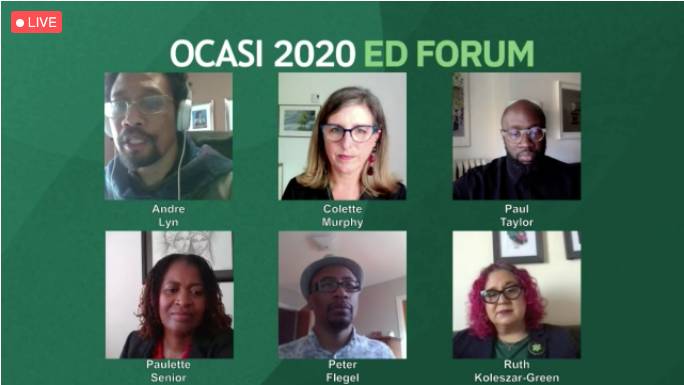
Colette Murphy is the Executive Director of the Atkinson Foundation. She made these opening remarks as a participant on a panel called Two Pandemics: Racism and Structural Inequities at the Ontario Council of Agencies Serving Immigrants (OCASI) annual Executive Directors Forum. It took place online on Wednesday, October 28, 2020.
I’m pleased to be here with you on the traditional territories of many nations – Anishnabek, Mississaugas of the Credit and Haudenosaunee Confederacy – and home to many First Nations, Métis and Inuit people today.
It’s an honour to be in conversation with Ruth, Paulette, Peter, Paul and André — all of whom inspire me to risk more for racial justice. I’m indebted to Debbie Douglas for this opportunity to add my perspective to the mix.
Back in the 90s, Debbie and I spent many days unpacking invisible backpacks of privilege as anti-racism trainers at Camp Kandalore in the Algonquin Highlands. Since then, our paths cross where people are organizing to re-write the unjust rules we live by in this country — to create more decent work and a fair economy. Most recently, the firestorm created by COVID-19 brought us together. We’ve been passing buckets as fast as we can from Atkinson to OCASI to people who are experiencing intense precarity in this moment.
I know it won’t surprise you that Debbie invariably calls on me to reflect more deeply about white supremacy when I least expect it but when I most need to do the work. I am, after all, a white, cis-gender, and straight mother of two. I’m also the head of a philanthropic foundation with a complex mission and a complicated history. That means the work is never done. But I take heart from the fact that I’m not doing it on my own. We can count on each other — and communities like this one that create and hold space for our collective and personal reckoning, and for repairing and reconstructing our social, political and economic relations.
In preparing to enter this discussion today, I tuned into the conversation Debbie has been having with you and other OCASI members since the start of the pandemic. Her blog posts have been a real gift to me and my team as we’ve grappled with what’s going on. I hear in Debbie’s words what Howard Thurman calls “the sound of the genuine”. So, I’d like to share three phrases that have stuck with me and that I’ve been turning over in my mind lately.
One, everything is up in the air.
Two, statements are not enough.
And three, we must centre our “collective imaginary” on a new world.
I’d like to say a few words about each point in the hope that my reflections will stimulate your own.
“Everything is up in the air. All narratives for the moment have been blown open, all the metrics are off … if only briefly.” This quote from poet laureate Dionne Brand reminds me that the ground game has never been more important. This means organizing people where they live and work around a few core ideas like human rights and equity. Systems and structures built to exclude and exploit Black, Indigenous and racialized folks are inherently immoral and unstable. Those built on the expectation of income and wealth inequality and environmental degradation are similar. Their collapse is inevitable, so reconstruction must become our shared work. If we let the gravity of this moment sink in, the possibility of transformation exists — if only briefly.
Statements are not enough. They can ground and tether us to people, places and values. But too often they are words in search of bodies to put them into action.
Using statements of solidarity as building blocks of new systems appeals to me given Atkinson’s focus on Black, Indigenous and racialized communities building power to change the rules. Community benefits agreements attached to public infrastructure projects like the Eglinton-Crosstown LRT communicate bold intentions but they also indicate where significant attention must be placed. On hiring targets, community amenities, support for existing small businesses and other economic opportunities for those who do not usually benefit directly from multi-million dollar development projects, for example.
Above all, we must centre our collective imaginary on a new world. I confess I had to look up the word “imaginary” when I saw it used as a noun and not an adjective in Debbie’s post. I discovered with some digging that this phrase has a deep and rich meaning. The collective imaginary is defined as “the set of values, institutions, laws, and symbols through which people imagine their social whole.”
It’s been said that when we can “put the argument into a concrete shape, into an image, some hard phrase, round and solid as a ball, which we can see and handle and carry home with us, and the cause is half won.” If the new world de-centres whiteness, then what shapes, images or phrases must our collective imaginary take?
I deeply appreciate Paulette’s focus on gender equality, and I look forward to hearing what Peter, Paul and Ruth think — and seeing where this question might take us in the next hour.
